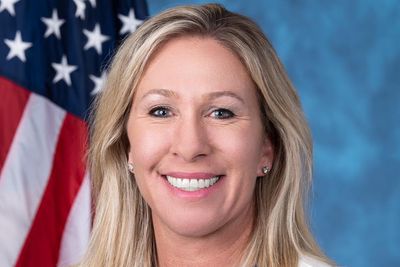Marjorie Taylor Greene’s ridiculous mask shows how out of touch she really is
The last four years of the Trump presidency will forever be one of the most trying times in United States history. Why is that you may ask? The United States House of Representatives managed to vote to impeach President Trump on one article of impeachment for the second time, charging him with provoking the Capitol Building's attack. Trump is the first U.S. president to experience an impeachment twice.
Despite the victory, it's hard not to look at how the president's staunch supporters reacted to the news and how they presented themselves. Let's bring in Georgia's 14th Congressional District Rep. Marjorie Taylor Greene (R). Greene, a QAnon enthusiast elected to Congress, stepped up to the podium at the Trump impeachment hearing and delivered a speech declaring that she is against it. She also didn't hesitate to attack the Black Lives Matter protests last year‑ all while wearing a mask.
"He has held over 600 rallies in the last four years and none of them included assaulting police, destroying businesses or burning down cities," Greene said live from the U.S. House Chamber. "Democrats have spent all this time endorsing and enabling violent riots that left billions in property damage and 47 dead."
READ: Opinion: The hypocrisy of how police treated the Capitol riots vs BLM protests
Although it's possible, there's still a long road ahead.
That's all fine and dandy to wear a mask because there's a pandemic going on, and we are experiencing new strands of the Covid-19 virus. But the most interesting thing about Greene, I feel, was not so much what she said. The mere fact that she was wearing a mask with "CENSORED" printed across the front of it was quite the sight to see.
Instinctively, the amount of confusion that came over me when I witnessed this was inevitable because she wasn't being censored as she expressed her thoughts on live TV. It prompted me to think, how can someone who has the privilege to speak before the House believe that their message is censored? Does she even know what censorship means?
I also couldn't help but wonder where her team was and why they didn't tell her that this is a fashion no-no.
For one, the definition of censorship is: "to examine in order to suppress or delete anything considered objectionable." I interpret this as a way to remove things that aim to be harmful to a group of people.
Here's what the internet had to say about it:
But given that she is a QAnon supporter and many of the social media pages associated with this group have been removed, she may have believed that platforms repeatedly censored her and supporters' views (which are rooted in the idea that Trump is fighting a cabal of pedophiles and the "deep state" within the country), hindering the First Amendment.
Even though the first amendment protects your freedom of speech, there are some limitations. If the speech is threatening to a group of people, incites any violence, or is a domestic terror threat, companies and social platforms would have the right to remove that content they see fit. In no way is this indicative of infringement on this right.
Now, Greene recently announced on Newsmax that on January 21, she plans to file articles of impeachment against President-elect Joe Biden for abuse of power in "buying foreign governments."
I believe that one of the reasons some people are claiming that they feel that they are being censored lived a life of privilege without repercussions for their actions when it's necessary. When organizations or companies start to crack down on these behaviors, they may feel that there is injustice at play, which couldn't be further from the case. The injustice here is the lack of taking accountability for wrongdoing.
Have you got something to say about this subject? Submit a post here and start the conversation.
